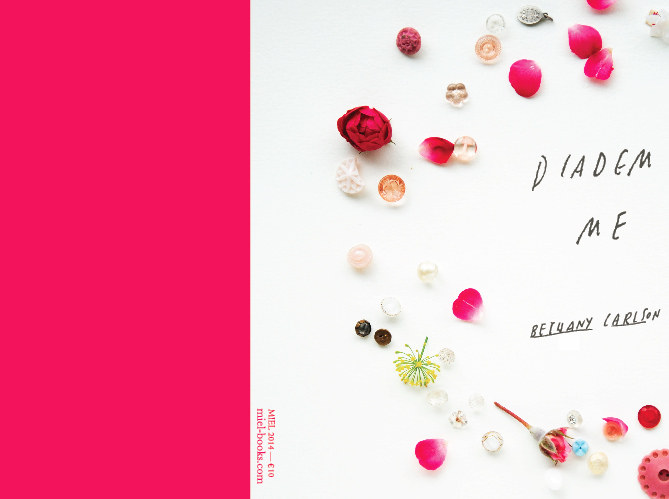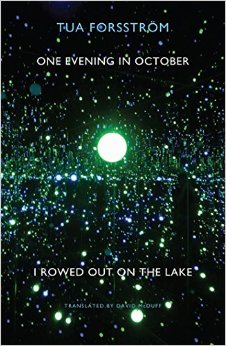State of the Union by Susan Lewis
– Reviewed by Becky Varley–Winter –
The cover of Susan Lewis’ latest pamphlet, State of the Union, shows ‘Marriage’ by Melissa Stern: two androgynous, different-coloured figures sit bolt upright, facing away from each other, straight-faced, back to back. Their posture is strong, but they appear absorbed in their own worlds: one closes their eyes dreamily, while the other stares pensively (or perhaps impassively) straight ahead. It’s a calm, centred image, playful yet unsentimental.
Inside is a series of prose poems, with something of the feel of Tender Buttons by Gertrude Stein, although they don’t dissemble sense to the extent that Stein does. The echo lies more in the CAPITALISED titles and creative punctuation. There are lots of heavy full stops, giving an absolute feeling to statements that may not actually be absolute. An assertiveness which Lewis seems to be playing with.
The first poem states
THIS IS NOT A MOVIE
but now & then it feels like one, & often has the same symptoms.
Are movies ill, and if so how? Lewis relates the movie to an ‘overload of blurred identities’: perhaps the difficulty of living in a crowd, or carrying many identities in yourself? ‘Unless it’s preferable to jump ship & sink on our merits, like grief-stricken elephants’: an elephant jumping overboard sounds perilous to the ship.
The title of the collection, State of the Union, has obviously political connotations, although political content is more implicit than fully explicit within the work. Lewis has suggested that ‘almost all of my work seems to address relation – its necessity and impossibility’, and many poems struggle with collective disillusionment, often conveyed through caustic, mordant wit. ‘IN WHICH’ describes people as ’embittered radishes’.
There is tenderness, too: the possibility ‘To un-gnarl the soul, open his arms or soften a lap and see who settles in’. This poem uses maxims as if it’s cautiously guarding its belly, just letting a bit of vulnerable flesh show:
Greed is a false ally. Chance is the highest power. Sprinkle something tasty on the void, extend the licked lips of tenderness.
‘SHE TRIED’ takes a sensual image and turns it into something like Invasion of the Body Snatchers: ‘the stone inside the fruit, still and quietly violent, waiting for its chance to replicate’. Growth threatens destruction, bursting. Children are ‘beautiful and cruel’. Full stops disrupt what might otherwise be a flow of abundance:
Blinded to these trees, flowering their hearts out. Pistil & stamen ripe & swollen, straining towards union.
This straining work contains much beauty, but Lewis seems suspicious of flights towards transcendence; she refers to ‘the invisible hand slapping us down’, and it’s as if this hand lives inside the poems too, unsettling attempted escapes. The ‘invisible hand’ is a reference to Adam Smith, and this is why the political content is implicit rather than explicit: you need to know your economic history to ‘get’ it and know that this poem contains a concise put-down of free-market capitalism. Yet I can tell, even before this, that these poems are interested in imprisonment. They sit, one to each page, like small boxes.
‘& TO TOLL A TIDBIT’ begins with the word ‘(ungraspable)’, then it’s as if the speaker appeals to the reader: ‘Stick with me, slide to somenought rich & strange’. The words ‘rich & strange’ reference Ariel’s song in The Tempest: Ariel is a slave, and slaves are referred to repeatedly through these poems, without marshalling into a rebellion: they’re quietly there. In ‘MEET ME’ there’s ‘rich & strange’ again:
Cheerily we go, wearily we go where all the men rich & strange. Until the frame reveals a story we can tell ourselves.
There’s a backdrop of – if not hopelessness – wry pessimism in these ‘stories we can tell ourselves’, refusing consolation. ‘SAY WHAT YOU WANT’ gets me in the guts:
Approach the nurse if you want to die, or don’t. He too being helpless & alone.
Not exactly cheerful, then, yet I like this collection. There’s something real in it. ‘SPEAKING OF’ is the last poem, and either paints people as horses, or writes from the point of view of a horse, a bit like the Houyhnhnm of Gulliver’s Travels: ‘Still we lick & stamp, feeling our oats. […] Wait for the boss to resign.’ While I sometimes wish for more pronounced rhythmic shifts – breaking through the walls – there’s pleasure in the resilience of these poems, their attention to the world (a ‘stubborn focus on the choreography of clouds’) despite everything, stamping their hooves.





